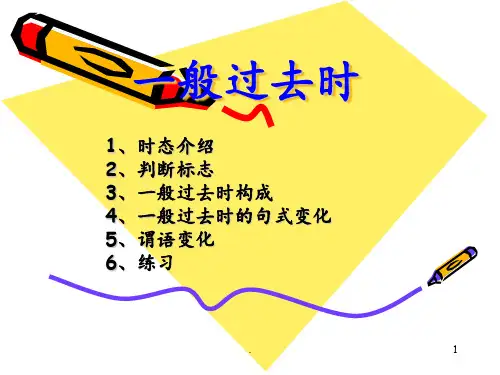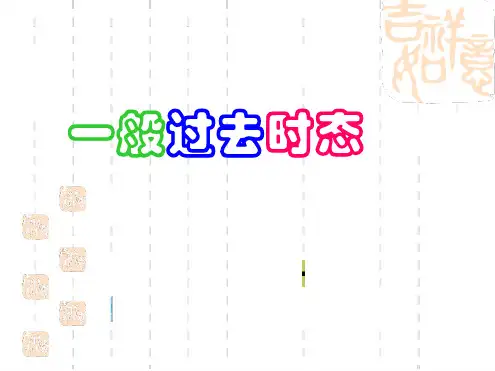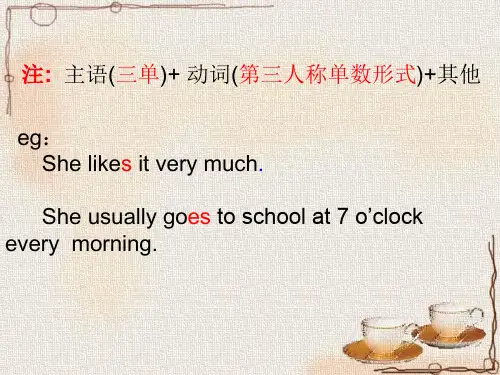一般过去时PPT课件
合集下载
一般过去时讲解PPT课件

Yes,you did.
Yes,I did. Yes,he/she/it did.
No,you did not. No, I did not. No,he/she/it did not.
work Did we work?
Did you work? Did they work?
Yes,we/you did. Yes,we did. Yes,they did.
grow -- grew know -- knew throw -- threw blow -- blew write -- wrote drive -- drove ride -- rode get -- got forget -- forgot lend -- lent send -- sent spend -- spent say -- said */sed/ pay -- paid stand -- stood understand -- understood let -- let put -- put cut -- cut read -- read2*0
.
1
1.定义:
(用法一) 一般过去时态表示过去某个时间发生的动 作或存在的状态,常和表示过去的时间状语连用;
eg:I got up at 7:00 yesterday.
My father was at work yesterday afternoon
(用法二) 也表示过去经常或反复发生的动作,常和 表示频度的时间状语连用。
写出下列动词的过去式:
go
went
use
think thought live
be
was/ were wake
happen happened keep
初中英语一般过去时课件(PPT)

played
did
don’t/ doesn’t
She doesn’t play basketball after school. She _________ basketball after school yesterday.
do/ does
didn’t
did
didn’t watch
didn’t play
一、句型转换 1. The children had a good time in the park. 否定句:The children did not have a good time in the park. 一般疑问句:Did the children have a good time in the park? 对划线部分提问:Where did the children have a good time? 2. There were about nine hundred people at the cinema. 否定句:There were not about nine hundred people at the cinema. 一般疑问句:Were there about nine hundred people at the cinema? 对划线部分提问:How many people at the cinema?
Did
Did
go
go
规则变化 1.一般加ed
2.以e结尾加d
3.末尾只有一个辅音字母的重读闭音节词,先双写这个辅音字母,再加ed .
work —
worked
change —
changed
prefer —
preferred
stop —
did
don’t/ doesn’t
She doesn’t play basketball after school. She _________ basketball after school yesterday.
do/ does
didn’t
did
didn’t watch
didn’t play
一、句型转换 1. The children had a good time in the park. 否定句:The children did not have a good time in the park. 一般疑问句:Did the children have a good time in the park? 对划线部分提问:Where did the children have a good time? 2. There were about nine hundred people at the cinema. 否定句:There were not about nine hundred people at the cinema. 一般疑问句:Were there about nine hundred people at the cinema? 对划线部分提问:How many people at the cinema?
Did
Did
go
go
规则变化 1.一般加ed
2.以e结尾加d
3.末尾只有一个辅音字母的重读闭音节词,先双写这个辅音字母,再加ed .
work —
worked
change —
changed
prefer —
preferred
stop —
一般过去时态ppt课件

2、表示过去经常或反复发生的动作。 My father often went to work by bus last year. When I was a child, I often listened to music.
可编辑课件PPT
9
6.练习
1.They_w_e_re(be) doctors last year. 2.You _h_a_d(have) a class this morning. 3.She_ra_n_ (run) very fast yesterday.
passed cooked
2、元浊 /d/ ,即 ed 在元音,浊辅音后面念 /d/ ,
例:borrowed enjoyed
called moved
3、/t/ /d/ 之后念 /id/ , 即 ed 在 /t/ /d/ 音后面念 /id/
可编辑课件PPT
例:wanted shouted needed counted6
4.一般过去时的否定和一般疑问句 1)We had a good time yesterday.
We didn’t have a good time yesterday. Did you have a good time yesterday? 2)She was a teacher in 1980s.
4.She_s_tu_d_ied (study) Chinese two years ago. 5.He_p_la_yed(play) tennis last week.
6.He found an amusing book.(变否定和一般疑问)
He didn’t find an amusing book.
stop stopped plan planned
一般过去时课件(PPT)

returned jumped
go to a park go swimming go fishing go hiking go skiing go ice-skating
go to a park go swimming go fishing go hiking go skiing go ice-skating
一般过去时态
wash the clothes visit grandparents clean the room watch TV climb a mountain learn chinese
row a boat answer the phone water the flower play the football
swam did was were studied
什么是一般过去时?
动词的一般过去时态表示 过去发生的 动作、情况或存在的状态 。
行为动词 ( 即实义动词 ) 的过去式没有人称 和数的变化。
所有时态都是通过
动词
变化来表现的
Be 动词的过去时态变化
我今年12 岁. I __a_m12 years old
fly kites read a book sing and dance eat good food take pictures buy presents see elephants swim do am/is are study
flew kites read a book sang and danced ate good food took pictures bought presents saw elephants
did
? 一、用行为动词的适当形式填空
lived ? 1. He _________ (live) in Wuxi two years ago. ate ? 2. The cat ________ (eat) a bird last night. had ? 3. We _______ (have) a party last Halloween. made ? 4. I ________ (make) a model ship with Mike
go to a park go swimming go fishing go hiking go skiing go ice-skating
go to a park go swimming go fishing go hiking go skiing go ice-skating
一般过去时态
wash the clothes visit grandparents clean the room watch TV climb a mountain learn chinese
row a boat answer the phone water the flower play the football
swam did was were studied
什么是一般过去时?
动词的一般过去时态表示 过去发生的 动作、情况或存在的状态 。
行为动词 ( 即实义动词 ) 的过去式没有人称 和数的变化。
所有时态都是通过
动词
变化来表现的
Be 动词的过去时态变化
我今年12 岁. I __a_m12 years old
fly kites read a book sing and dance eat good food take pictures buy presents see elephants swim do am/is are study
flew kites read a book sang and danced ate good food took pictures bought presents saw elephants
did
? 一、用行为动词的适当形式填空
lived ? 1. He _________ (live) in Wuxi two years ago. ate ? 2. The cat ________ (eat) a bird last night. had ? 3. We _______ (have) a party last Halloween. made ? 4. I ________ (make) a model ship with Mike
一般现在时和一般过去时ppt课件

carryies do es wash es visit s exercise s enjoy s jump s hhaavse
一般现在时否定式
be + not don’t do / doesn’t do
II 一般现在时的否定式
1.Be 动词的否定式: be + not
I am a teacher.
把下列句子改为否定句
1.My father has an egg for breakfast . My father doesn’t have an egg for breakfast .
2.Li Lei does his homework after school. Li Lei doesn’t do his homework after school.
1. We often __p_la_y_ (play) in the playground. 2. He _g_et_s_ (get) up at six o’clock. 3. _D_o_ you b_r_u_s_h (brush) your teeth every morning? 4. What d_o_e_she usually_d_o_ (do) after school? 5. Danny_s_t_ud_i_e_s (study) English, Chinese, Maths, Science and Art at school. 6. Mike sometimes _g_o_es__(go) to the park with his sister. 7. She w_a_t_ch_e_s (watch) TV with his parents every evening. 8.D__oe_s_ Mike _r_ea_d_(read) English every day?
一般过去时的讲解ppt课件完整版

“studied”。
助动词did的用法
在一般过去时中,助 动词“did”用于构 成疑问句和否定句。
在回答一般过去时的 疑问句时,可以用 “did”的相应形式 进行回答。
“did”后面跟动词 原形,表示过去某个 时间发生的动作或状 态。
一般过去时的否定句和疑问句
否定句
在动词前加“didn’t”,后面跟动词原形,表示过去某个时间没有发生的动 作或状态。例如:“I didn’t go to the park yesterday.”(昨天我没有去公 园。)
陈述句改疑问句
指导学生将一般过去时的 陈述句改写为疑问句,注 意语序的调整和助动词 did的使用。
特殊疑问句的回答
给出特殊疑问句及其回答 ,让学生熟悉一般过去时 特殊疑问句的构成和回答 方式。
阅读理解中一般过去时的识别与运用
阅读文章并回答问题
提供一篇含有一般过去时的文章,让学生阅读后回答与文章内容 相关的问题。
疑问句
将助动词“did”放在主语前构成疑问句,表示询问过去某个时间是否发生了某 个动作或状态。例如:“Did you go to the park yesterday?”(昨天你去公 园了吗?)
04
一般过去时的重点与难点
BIG DATA EMPOWERS TO CREATE A NEW
ERA
不规则动词的过去式
识别一般过去时的标志词
列出一般过去时的常见标志词,如yesterday, last week等,让学 生在阅读过程中识别并标注出来。
运用一般过去时描述事件
要求学生运用一般过去时描述一个发生在过去的事件,注意动词过 去式的正确使用和句子结构的完整性。
THANKS
感谢观看
1 2
助动词did的用法
在一般过去时中,助 动词“did”用于构 成疑问句和否定句。
在回答一般过去时的 疑问句时,可以用 “did”的相应形式 进行回答。
“did”后面跟动词 原形,表示过去某个 时间发生的动作或状 态。
一般过去时的否定句和疑问句
否定句
在动词前加“didn’t”,后面跟动词原形,表示过去某个时间没有发生的动 作或状态。例如:“I didn’t go to the park yesterday.”(昨天我没有去公 园。)
陈述句改疑问句
指导学生将一般过去时的 陈述句改写为疑问句,注 意语序的调整和助动词 did的使用。
特殊疑问句的回答
给出特殊疑问句及其回答 ,让学生熟悉一般过去时 特殊疑问句的构成和回答 方式。
阅读理解中一般过去时的识别与运用
阅读文章并回答问题
提供一篇含有一般过去时的文章,让学生阅读后回答与文章内容 相关的问题。
疑问句
将助动词“did”放在主语前构成疑问句,表示询问过去某个时间是否发生了某 个动作或状态。例如:“Did you go to the park yesterday?”(昨天你去公 园了吗?)
04
一般过去时的重点与难点
BIG DATA EMPOWERS TO CREATE A NEW
ERA
不规则动词的过去式
识别一般过去时的标志词
列出一般过去时的常见标志词,如yesterday, last week等,让学 生在阅读过程中识别并标注出来。
运用一般过去时描述事件
要求学生运用一般过去时描述一个发生在过去的事件,注意动词过 去式的正确使用和句子结构的完整性。
THANKS
感谢观看
1 2
一般过去时写作课件ppt
evening the day before yesterday
morning evening day Monday afternoon
为深入学习习近平新时代中国特色社 会主义 思想和 党的十 九大精 神,贯彻 全国教 育大会 精神,充 分发挥 中小学 图书室 育人功 能
5.与that连用:
morning winter that day year
为深入学习习近平新时代中国特色社 会主义 思想和 党的十 九大精 神,贯彻 全国教 育大会 精神,充 分发挥 中小学 图书室 育人功 能
一般过去时态:
动词的一般过去时态表示过去发生的动作、 情况或存在的状态。
谓语构成
1.动词be → was, were 2.动词have, has→ had 3.助动词do, dose→ did 4.行为动词用过去式(行为动词即实义动词)它 的过去式没有人称和数的变化,was, were除外。 (所有时态都是通过动词的变化来表现的)
Thank you! Goodbye!
为深入学习习近平新时代中国特色社 会主义 思想和 党的十 九大精 神,贯彻 全国教 育大会 精神,充 分发挥 中小学 图书室 育人功 能
用法
1.在过去某一时间内发生的动作:
He got home at ten o’clock last night. 2.表示过去经常或反复发生的动作,常于 often, always等表示拼读的时间状语连用
ago
last
month
one week
term
six months
M入学习习近平新时代中国特色社 会主义 思想和 党的十 九大精 神,贯彻 全国教 育大会 精神,充 分发挥 中小学 图书室 育人功 能
morning evening day Monday afternoon
为深入学习习近平新时代中国特色社 会主义 思想和 党的十 九大精 神,贯彻 全国教 育大会 精神,充 分发挥 中小学 图书室 育人功 能
5.与that连用:
morning winter that day year
为深入学习习近平新时代中国特色社 会主义 思想和 党的十 九大精 神,贯彻 全国教 育大会 精神,充 分发挥 中小学 图书室 育人功 能
一般过去时态:
动词的一般过去时态表示过去发生的动作、 情况或存在的状态。
谓语构成
1.动词be → was, were 2.动词have, has→ had 3.助动词do, dose→ did 4.行为动词用过去式(行为动词即实义动词)它 的过去式没有人称和数的变化,was, were除外。 (所有时态都是通过动词的变化来表现的)
Thank you! Goodbye!
为深入学习习近平新时代中国特色社 会主义 思想和 党的十 九大精 神,贯彻 全国教 育大会 精神,充 分发挥 中小学 图书室 育人功 能
用法
1.在过去某一时间内发生的动作:
He got home at ten o’clock last night. 2.表示过去经常或反复发生的动作,常于 often, always等表示拼读的时间状语连用
ago
last
month
one week
term
six months
M入学习习近平新时代中国特色社 会主义 思想和 党的十 九大精 神,贯彻 全国教 育大会 精神,充 分发挥 中小学 图书室 育人功 能
小学英语一般过去时PPT课件
小学英语一般过去时
past 过去
now 现在
future 将来
• 基本结构 • 主语+动词过去式+其他;
例:1: I bought you this book about America
2: Sam ate a hot dog yesterday.
3: They went to the park last week.
eat
say see drink win
ate
said saw drank won
用括号内所给的单词的适当形式填空。
1:I watche(dwatch)a football game yesterday. 2: wewill go (go) to school tomorrow. 3: I made(make) a cake last week. 4: Tomis playing football now, but they played
练习
Played used studied planned
worry
worried
stop
stopped
hope
hoped
do go have make get
did went had made got
am, is are do
go have make get
was were did
went had made got
look play start
looked played started
2、以不发音的 -e 结尾动词,动词 词尾加 -- d
live
lived
hope
hoped
use
used
3. 以“辅音字母+y”结尾的词, 先变“y”为“i”再加—ed
past 过去
now 现在
future 将来
• 基本结构 • 主语+动词过去式+其他;
例:1: I bought you this book about America
2: Sam ate a hot dog yesterday.
3: They went to the park last week.
eat
say see drink win
ate
said saw drank won
用括号内所给的单词的适当形式填空。
1:I watche(dwatch)a football game yesterday. 2: wewill go (go) to school tomorrow. 3: I made(make) a cake last week. 4: Tomis playing football now, but they played
练习
Played used studied planned
worry
worried
stop
stopped
hope
hoped
do go have make get
did went had made got
am, is are do
go have make get
was were did
went had made got
look play start
looked played started
2、以不发音的 -e 结尾动词,动词 词尾加 -- d
live
lived
hope
hoped
use
used
3. 以“辅音字母+y”结尾的词, 先变“y”为“i”再加—ed
一般过去时课件
一般过去时课件(PPT)
本课程将帮助您更好地了解一般过去时的概述、用法、句型和副词。我们将 从简单到复杂、从基础到高级,为您呈现全方位的知识。
一般过去时的概述
含义
表示过去某个时间或某一段时间内发生的动作 或存在的状态。
动词变化
一般情况下,加-ed,如played。
时态标志词
昨天、上个星期、去年、十年前等表示过去时 间的词语。
动词
在疑问句中,动词出现在主语 前面。
标志词
疑问句需要使用疑问词语,如 did。
一般过去时的频率副词
常用频率副词
always, usually, often, sometimes, never等。
位置
频率副词通常出现在动词之前,如I always did my homework after school。
常见非规则动词
went, ate, saw, drank, came等。
一般过去时的用法
叙述过去的事情
过去状态
昨天你去哪儿了?我去了海边玩。 昨天的天气非常好。
表示过去长时间内的动作
我在大学学习了四年。
表达注意的对象
在我小时候,我很喜欢听Yo-Yo Ma的音乐。
一般过去时的肯定句结构
1
主语
一般过去时句子的主语可以是人或物。
一般过去时的特殊副词
yesterday, last week, in 2010, 5 years ago等。
一般过去时的时间状语副词
具体的日期和时间
Last Monday, 2 weeks ago, at 8pm 等。
一天内的时间
in the morning, at noon, in the afternoon, at night等。
本课程将帮助您更好地了解一般过去时的概述、用法、句型和副词。我们将 从简单到复杂、从基础到高级,为您呈现全方位的知识。
一般过去时的概述
含义
表示过去某个时间或某一段时间内发生的动作 或存在的状态。
动词变化
一般情况下,加-ed,如played。
时态标志词
昨天、上个星期、去年、十年前等表示过去时 间的词语。
动词
在疑问句中,动词出现在主语 前面。
标志词
疑问句需要使用疑问词语,如 did。
一般过去时的频率副词
常用频率副词
always, usually, often, sometimes, never等。
位置
频率副词通常出现在动词之前,如I always did my homework after school。
常见非规则动词
went, ate, saw, drank, came等。
一般过去时的用法
叙述过去的事情
过去状态
昨天你去哪儿了?我去了海边玩。 昨天的天气非常好。
表示过去长时间内的动作
我在大学学习了四年。
表达注意的对象
在我小时候,我很喜欢听Yo-Yo Ma的音乐。
一般过去时的肯定句结构
1
主语
一般过去时句子的主语可以是人或物。
一般过去时的特殊副词
yesterday, last week, in 2010, 5 years ago等。
一般过去时的时间状语副词
具体的日期和时间
Last Monday, 2 weeks ago, at 8pm 等。
一天内的时间
in the morning, at noon, in the afternoon, at night等。
英语八大时态PPT课件(详细版)
时态
A
知识导航
种类
一般现在时 一般过去时 一般将来时 现在进行时 现在完成时 过去进行时 过去完成时 过去将来时
构成
do/does did will/shall+动词原形 am/is/are + doing have/has+过去分词 was/were + doing had+过去分词 would/should+动词原 形
A
4
※表示主语所具有的特征、性格、 能力、状态等
She is a middle school student. She looks a little worried. ※某些以here/there开头的句子 中,用一般现在时表正发生的动 作
Here comes the bus.
A
5
※表示将来发生的、时刻表上不改变的事 The train leaves Hunan at five o’clock. ※特殊情况 在时间状语从句和条件状语从句中,若主 句用一般将来时,则从句用一般现在代替 将来。(主将从现)
A
21
四、一般将来时
1、构成 一般将来时态由
“will/shall+动词原形”构成,me to ask Mary for help.
A
22
2、其他表示
※be going to +动词原形:表示 说话人主观的打算或预测。 I am going to look for a job here. It is going to be a fine day for camping tomorrow.
【小试牛刀】 他们昨天这个时候正在吃晚餐。
They were having dinner this time yesterday.
A
知识导航
种类
一般现在时 一般过去时 一般将来时 现在进行时 现在完成时 过去进行时 过去完成时 过去将来时
构成
do/does did will/shall+动词原形 am/is/are + doing have/has+过去分词 was/were + doing had+过去分词 would/should+动词原 形
A
4
※表示主语所具有的特征、性格、 能力、状态等
She is a middle school student. She looks a little worried. ※某些以here/there开头的句子 中,用一般现在时表正发生的动 作
Here comes the bus.
A
5
※表示将来发生的、时刻表上不改变的事 The train leaves Hunan at five o’clock. ※特殊情况 在时间状语从句和条件状语从句中,若主 句用一般将来时,则从句用一般现在代替 将来。(主将从现)
A
21
四、一般将来时
1、构成 一般将来时态由
“will/shall+动词原形”构成,me to ask Mary for help.
A
22
2、其他表示
※be going to +动词原形:表示 说话人主观的打算或预测。 I am going to look for a job here. It is going to be a fine day for camping tomorrow.
【小试牛刀】 他们昨天这个时候正在吃晚餐。
They were having dinner this time yesterday.
